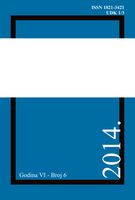Teorija racionalnog izbora i Bekerov model slučajnog ponašanja
Rational choice theory and Beker’s model of random behavior
Author(s): Miloš S. KrstićSubject(s): Psychology
Published by: АЛФА БК УНИВЕРЗИТЕТ
Keywords: rational choice theory; Beker’s model of random behavior; generalized axiom of revealed preference; falsifiability; utility maximization; rationality assumption
Summary/Abstract: According to rational choice theory, rational consumers tend to maximize utility under a given budget constraints. This will be achieved if they choose combination of goods that can not satisfy their needs and provide the maximum level of utility. Gary Becker imagines irrational consumers who choose bundle on the budget line. As irrational consumers has an equal probability of choosing any bundle on the budget line, on average, we expect that they will pick the bundle lying at the midpoint of the line. The results of researchs in which artificial Becher’s agents choose among more than two commodities rational choice theory is small. and in more than two budget/price situations show that the percentage of agents whose behavior violate Adding some factors to Becker’s model of random behavior, experimenters can minimize these minor violations and fit the actors’ choice with the theory. In addition, the results of organizations’choices analysis show that the observed agents behave rationally, and this behavior confirms the theory rational choice. Therefore, rational choice theory is unfalsifiable. As the theory can always fits with the facts, it would have been much more productive if we had admitted that the theory was falsifiable and then debated its explanatory value in specific circumstances.
Journal: Glasnik za društvene nauke
- Issue Year: 2014
- Issue No: 6
- Page Range: 103-120
- Page Count: 18
- Language: Serbian

